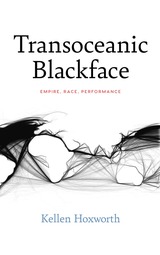104 books about Death, Grief, Loss and 11
start with L
104 books about Death, Grief, Loss and 11
104 books about Death, Grief, Loss
11 start with L start with L
11 start with L start with L

The Land of the Dead Is Open for Business
Jacob Strautmann
Four Way Books, 2020
The Land of the Dead Is Open for Business is an extended elegy for Jacob Strautmann’s home state of West Virginia and its generations of inhabitants sold out by the false promise of the American Dream. Throughout the book, voices rise up from the page to describe a landscape eroded and plundered by runaway capitalism—its mountain tops leveled by the extractive industries, its waters polluted by runoff from mines—and the fallout from that waste. Those who remain are consigned to life in a ravaged land denuded of nature where birds die and “Sheep / birth limp two-headed things and some / that speak like men if they speak at all.”
[more]
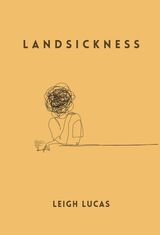
Landsickness
Leigh Lucas
Tupelo Press, 2024
A lyric essay about young love and loss and the aftermath of a former lover’s suicide.
Landsickness explores the inelegant progress of grief and pursues a relentless search for evidence of the beloved’s presence through the physics of splashes, the history of seasickness, and the science of depression. While full of tenderness, the poems employ humor and honesty to observe the ugliness of grief and the failure of elegy to restore the dead.
From the funeral to the office of her dead-end job to navigating the streets of New York, the speaker experiences a series of false starts as she learns to cope with her new life. Still, there is a real sense of progression in the collection’s end, even as the speaker continues to ask herself: “Why am I obsessed with the physics of his fall?"
Landsickness explores the inelegant progress of grief and pursues a relentless search for evidence of the beloved’s presence through the physics of splashes, the history of seasickness, and the science of depression. While full of tenderness, the poems employ humor and honesty to observe the ugliness of grief and the failure of elegy to restore the dead.
From the funeral to the office of her dead-end job to navigating the streets of New York, the speaker experiences a series of false starts as she learns to cope with her new life. Still, there is a real sense of progression in the collection’s end, even as the speaker continues to ask herself: “Why am I obsessed with the physics of his fall?"
[more]
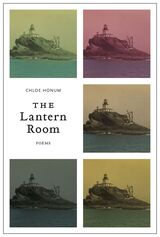
The Lantern Room
Chloe Honum
Tupelo Press, 2021
“In The Lantern Room, her exquisite new collection, Chloe Honum moves, as her poems do, with range, precision, and astonishing beauty. Honum’s speaker travels across Arkansas motel to motel, missing a beloved, and in the book’s crown jewel, ‘The Common Room,’ chronicles an out-patient hospitalization in a psychiatric ward. The collection closes with sublime meditations on the speaker’s mother’s death: ‘How will I live without her?’ How, indeed. This book is that survival, and more than that, an extraordinary mind pressing through language to speak so deeply, so startlingly, the reader is made larger to receive its enormous gift: ‘But I have rain in my hair. This much is true. Let me bring it to you.’”
—Allison Benis Whit
—Allison Benis Whit
[more]
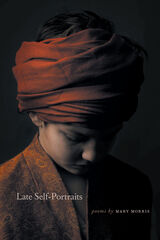
Late Self-Portraits
Mary Morris
Michigan State University Press, 2022
A compelling collection of poems, Late Self-Portraits conveys an intimate description of lives through a collage of portraits and affliction. Weaving history and the sacred, both intimate and worldly, one encounters a blind Jorge Luis Borges with his mother, a glass confessional in the of Notre Dame Cathedral, Frida Kahlo in Mexico, ghosts, a neurosurgeon’s prognosis, and Marie Laveau in New Orleans. Whether in a field with Joan of Arc, encountering the artist Jean-Michel Basquiat, or having dinner with Hades, these are haunting poems of loss and unearthing, equally bold, personal, and tender.
From “Dinner with Hades”:
He shows me a birthday cake, candled. My name is written in pomegranate
seeds. It’s like vertigo. Just before he seeks to devour, he halts to birdsong—
sound of goldfinch, bluebird, hawk, lilting of sparrows. Of whippoorwill
and dove. Wings flap, so many wings, a cool breeze as leaves unfurl into a
once forgotten green and I am back on earth, held in my mother’s arms.
From “Dinner with Hades”:
He shows me a birthday cake, candled. My name is written in pomegranate
seeds. It’s like vertigo. Just before he seeks to devour, he halts to birdsong—
sound of goldfinch, bluebird, hawk, lilting of sparrows. Of whippoorwill
and dove. Wings flap, so many wings, a cool breeze as leaves unfurl into a
once forgotten green and I am back on earth, held in my mother’s arms.
[more]
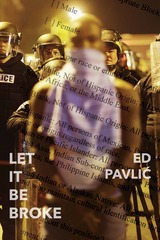
Let It Be Broke
Ed Pavlic
Four Way Books, 2020
The poems in Ed Pavlić’s Let It Be Broke are ignited by sonic memories—from Chaka Khan on the radio to his teenaged daughter singing “Stay” at a local café—that spark a journey into personal and ontological questions. Pavlić’s lyric lines are equal parts introspection and inter-spection, a term he coins for the shared rumination that encourages some collective deep thinking about the arbitrary boundaries that perpetuate racial and geographic segregation and the power of words to transcend those differences. In an epiphanic moment, Pavlić recalls a quote shared by a former teacher as “a hammer made of written words,” and how he held “onto those words / as if they were steel bars and I was dangling over some bright black deepness.”
[more]
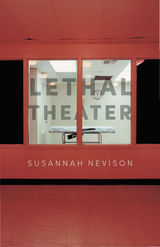
Lethal Theater
Susannah Nevinson
The Ohio State University Press, 2019
In her new poetry collection, Lethal Theater, Susannah Nevison reckons with the rituals of violence that underpin the American prison system, both domestically and abroad. Exploring the multiple roles of medicine in incarceration, Nevison’s poems expose the psychological and physical pain felt by the prison system’s inhabitants. Nevison asks readers to consider the act and complications of looking—at the spectacle of punishment, isolation, and interrogation, as mapped onto incarcerated bodies—by those who participate in and enforce dangerous prison practices, those who benefit from the exploitation of incarcerated bodies, and those who bear witness to suffering. Unfolding in three sections, Nevison’s poems fluidly move among themes of isolation and violence in prisons during period of war, the history of medical experimentation on domestic prisoners, and the intersection between anesthesia used in hospital settings and anesthesia used in cases of lethal injection. Lethal Theater is an attempt to articulate and make visible a grotesque and overlooked part of American pain.
[more]

Letters from the Black Ark
D.S. Marriott
Omnidawn, 2023
Rhythmic lyrical poems that embody black music, existence, and tragedy.
The poems in this collection center on the word “dub,” which accrues a subtle lyrical connotation throughout its various forms and meanings—to bestow, vest, crown, and also to suspend, reverb, echo, and sever. Dub poetry plays with revealing and concealing, while also pointing the way to the conditions that produce black poetic music. In D.S. Marriott’s poetry, tragic catastrophes of current black existence—London knife crime, the Windrush scandal, Grenfell, and deadly race violence—are portrayed as questions of language. To speak this language, as Marriott’s poem show, is to take on the forces that cause rupture. Throughout these poems of loss, exile, and obliteration, the poet foresees his downfall and metamorphosis, ultimately realizing too late that he cannot transcend the reverberations and echoes laden with black social death.
The poems in this collection center on the word “dub,” which accrues a subtle lyrical connotation throughout its various forms and meanings—to bestow, vest, crown, and also to suspend, reverb, echo, and sever. Dub poetry plays with revealing and concealing, while also pointing the way to the conditions that produce black poetic music. In D.S. Marriott’s poetry, tragic catastrophes of current black existence—London knife crime, the Windrush scandal, Grenfell, and deadly race violence—are portrayed as questions of language. To speak this language, as Marriott’s poem show, is to take on the forces that cause rupture. Throughout these poems of loss, exile, and obliteration, the poet foresees his downfall and metamorphosis, ultimately realizing too late that he cannot transcend the reverberations and echoes laden with black social death.
[more]
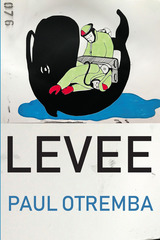
Levee
Paul Otremba
Four Way Books, 2019
The poems in Paul Otremba’s Levee explore the intersection between the ecological, the political, and the personal in a world built on oil and greed. The city of Houston is at once backdrop and metaphor for the ways in which violence—both natural and manmade—have become part and parcel of twenty-first century life. “It’s a luxury to be this calm,” Otremba writes in the opening poem, a held-breath between the disastrous effects of hurricanes and cancer. Yet Otremba’s exquisite lines manage to wrest meaning from the devastation wrought by both global warming and a terminal illness: “If there is a lesson / on how not to worry, it’s that you’re not stuck only being one thing, /the multitudes in me and the multitudes in you.”
[more]
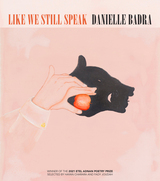
Like We Still Speak
Danielle Badra
University of Arkansas Press, 2021
Winner of the 2021 Etel Adnan Poetry Prize
Conversation and memory are at the heart of Danielle Badra’s Like We Still Speak, winner of the 2021 Etel Adnan Poetry Prize. In her elegiac and formally inventive debut, Badra carries on talking with the sister and father she has lost, often setting her words alongside theirs and others’ in polyphonic poems that can be read in multiple directions. Badra invites the reader to engage in this communal space where she investigates inheritance, witnessing, intimacy, and survival.
“This is a deeply spiritual book, all the more so because of its clarity and humility. Yet, we cannot walk away from the addictive command that so many of these poems ask us to follow: to read them along plural paths whose order changes while their immeasurable spirit remains unbound. Each poem is a singular vessel—of narratives, embodiments that correspond with memories, memories that recollect passion. . . . Like We Still Speak is a sanctum. Inside it, we are enthralled by beauty, consoled by light, sustained by making.”
—Fady Joudah and Hayan Charara, from the Preface
Conversation and memory are at the heart of Danielle Badra’s Like We Still Speak, winner of the 2021 Etel Adnan Poetry Prize. In her elegiac and formally inventive debut, Badra carries on talking with the sister and father she has lost, often setting her words alongside theirs and others’ in polyphonic poems that can be read in multiple directions. Badra invites the reader to engage in this communal space where she investigates inheritance, witnessing, intimacy, and survival.
“This is a deeply spiritual book, all the more so because of its clarity and humility. Yet, we cannot walk away from the addictive command that so many of these poems ask us to follow: to read them along plural paths whose order changes while their immeasurable spirit remains unbound. Each poem is a singular vessel—of narratives, embodiments that correspond with memories, memories that recollect passion. . . . Like We Still Speak is a sanctum. Inside it, we are enthralled by beauty, consoled by light, sustained by making.”
—Fady Joudah and Hayan Charara, from the Preface
[more]
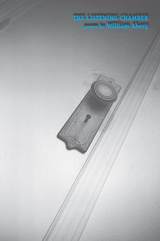
The Listening Chamber
Poems
William Aberg
University of Arkansas Press, 1997
Winner of the seventh annual Arkansas Poetry Award, William Aberg presents in The Listening Chamber a gallery of poetic forms, from short free-verse lyrics and crafted prose poems to original forms skillfully matched with their subjects. He writes comfortably of cats or derringers, the idylls of childhood, or of patients in mental hospitals. Throughout his poetry there runs a proletarian strain of dissatisfaction, an unrest coupled with dexterous wit and a remarkable sense of wonder. Convincingly, he populates these poems with farm workers, romantics, fugitives, lovers, beeches, elms, and constellations. With influences as wide ranging as William Stafford, Miklos Radnoti, and René Magritte, Aberg has fashioned a first collection in which every poem is a unique and haunting experience.
[more]
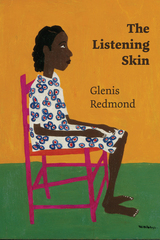
The Listening Skin
Glenis Redmond
Four Way Books, 2022
Hewing close to the bone, the incendiary poems in The Listening Skin explore how an artist dares to dance and create through a pain-riddled body. Corporeal and spiritual, immediately personal and deeply historical, Redmond's latest collection details how generational cycles of poverty, mental and physical illness, and systemic racism impact the self, the family, and the greater African-American collective. Examining the connection between adverse childhood experiences and adult chronic conditions, Redmond's poems arise from her deepest listening, beyond the skin, rooted in the marrow. They speak to the hardship of enduring fibromyalgia and the ongoing challenges of multiple myeloma while rejoicing in survival and the grace of existence itself. Yes, The Listening Skin affirms life and demands the dignity its speaker deserves: "I am full of this past present heat / I carry. / I come to the shore, / but I vacate nothing." This consummate work honors embodied knowledge, all that's heard at the boundary between flesh and air, vacating nothing, determinedly and brilliantly whole.
[more]
READERS
Browse our collection.
PUBLISHERS
See BiblioVault's publisher services.
STUDENT SERVICES
Files for college accessibility offices.
UChicago Accessibility Resources
home | accessibility | search | about | contact us
BiblioVault ® 2001 - 2024
The University of Chicago Press


